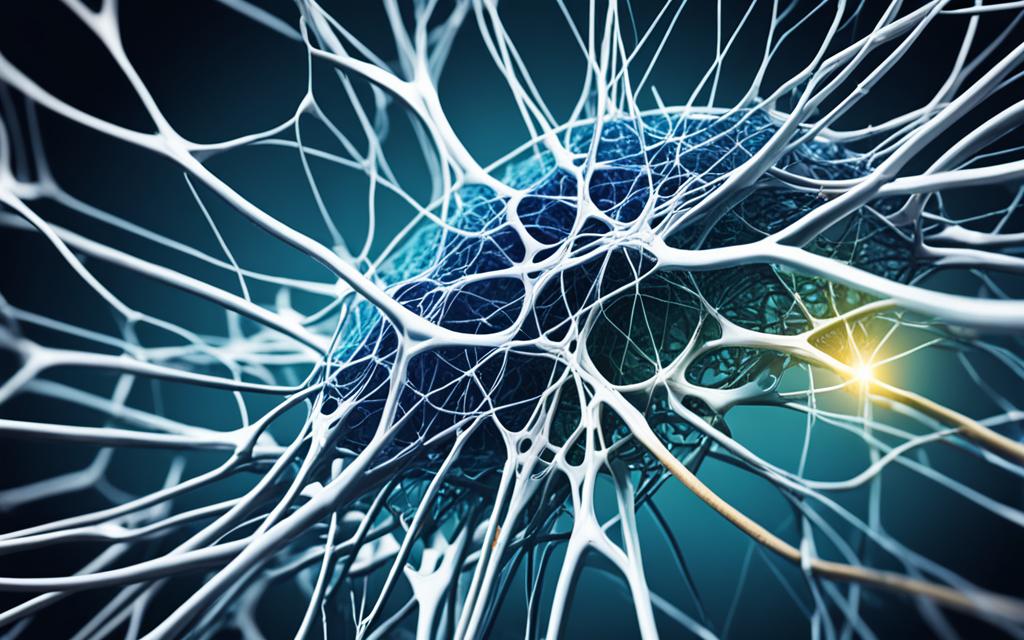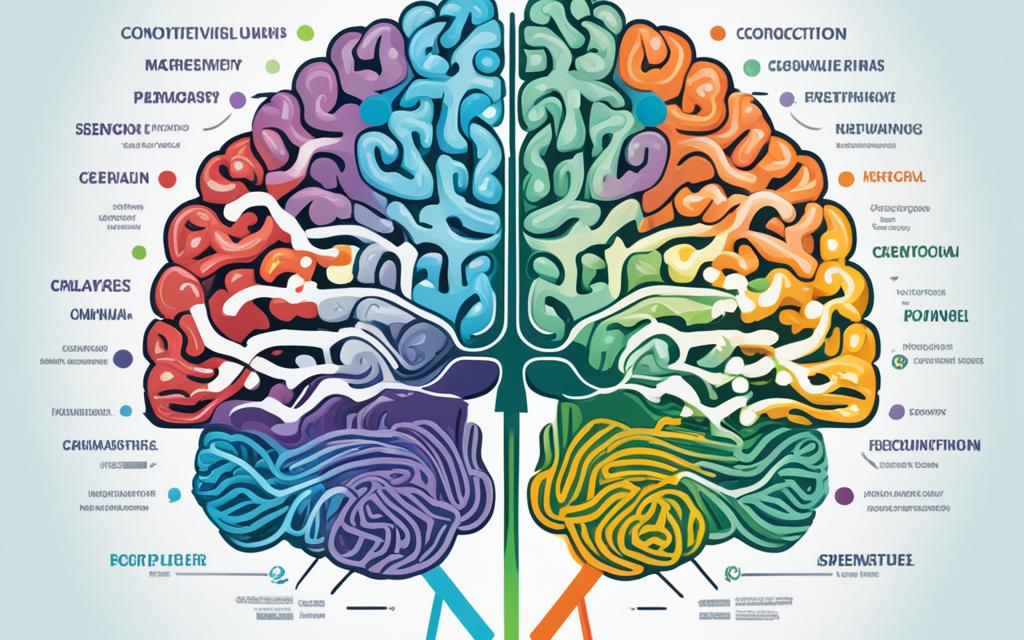Neuropsychology: Exploring the Essence of Brain Function
The human brain is a complex mystery that scientists and scholars love to solve. Neuropsychology sits at the crossroads of neuroscience and psychology. It looks at how the brain’s functions relate to our behaviors, thoughts, and mental processes.
This field helps us understand why we remember things, how we use language, and where attention comes from. It reveals insights about memory disorders, language problems, and attention issues. By exploring these connections, we learn a lot about our brain and how it works.
Neuropsychologists use advanced tools and techniques to peek inside our minds, like brain mapping and neuroimaging. These methods help them understand the complex working of our brains. They study how different brain areas link to memory, language, and attention.
This knowledge is key to helping people with memory loss, communication troubles, and brain injuries. Neuropsychology plays a crucial role in diagnosing, treating, and rehabilitating such conditions.
Key Takeaways
- Neuropsychology is the study of the relationship between brain function and behavior, cognition, and mental processes.
- It explores the connections between the brain and various aspects of human functioning, such as memory, language, attention, and executive functions.
- Techniques like brain mapping, neuroimaging, and neuropsychological assessments are used to study brain structure and function.
- Neuropsychology provides insights into memory disorders, language processing impairments, attention deficits, and brain injuries.
- Understanding the neural underpinnings of cognitive processes is crucial for diagnosis, treatment, and rehabilitation.
What is Neuropsychology?
Neuropsychology is a field that connects neuroscience, psychology, and other subjects. It looks at how the brain’s structure and function influence our thoughts and behaviors. It helps us understand how the brain affects our mental processes.
Definition and Scope
At its core, neuropsychology studies how the brain supports thinking, memory, and language skills. It shows us how our brain’s health plays a big part in our daily life. For example, how brain injuries can change our behavior.
Historical Origins
Neuropsychology had its beginnings in the late 19th century. Scientists like Paul Broca and Carl Wernicke started to show which parts of the brain control different skills. Since then, new technologies have helped us learn more about the brain.
Interdisciplinary Nature
Neuropsychology uses knowledge from many areas like neuroscience and computer science. This helps us study how the brain works and influences our actions. It also looks into how to improve attention and memory.
By bringing together information from different fields, neuropsychology has advanced. It has helped us understand problems like memory loss and language difficulties better. This has led to improved ways of diagnosing and treating these issues.
Cognitive Neuroscience: The Study of Brain and Behavior
Cognitive neuroscience looks at how the brain and behavior connect. It blends ideas from neuroscience and psychology to study how our brains work. This helps us learn more about thinking, making choices, and interacting with our world.
Brain Mapping Techniques
New brain imaging techniques have changed how we see the brain’s inside. They let us look closer to see how the brain is structured and works. This detailed look is a big step in understanding our minds better.
- Functional Magnetic Resonance Imaging (fMRI): fMRI shows which parts of the brain are active based on blood flow. It helps connect certain brain areas to our thinking and how we react to things.
- Positron Emission Tomography (PET): PET uses a tracer to show brain activity. It is key in studying brain issues and reactions to medicines.
- Electroencephalography (EEG): EEG catches the brain’s electrical signals to see real-time reactions. It is great for understanding immediate responses of the brain.
Neuroimaging and Its Applications
Brain imaging has many uses in studying thought processes and behavior. For example:
- We use it to know more about attention, memory, and how we use language and make choices, by seeing which parts of the brain are busy.
- It’s vital in finding and watching over brain and mental health issues, like Alzheimer’s, Parkinson’s, and depression.
- It tracks how well treatments work and how the brain changes when we get better.
- We also use it to look at why people might think differently, have certain qualities, or act in unique ways.
Seeing the brain work live has changed how we understand thinking and behavior. This has led to big steps in brain science and psychology.
Adding brain imaging to other methods helps us see the link between our brain’s shape, how it works, and what we do. This gives us a better view of the mind and all its details.
Neuropsychological Assessment: Unveiling Brain Functions
Neuropsychological assessment is vital in neuropsychology. It looks deep into how the brain works and affects thinking skills. This evaluation shows the hidden brain issues that can affect memory, language, and attention.
Standardized Tests
Standardized tests are key in this area. They are tools for measuring things like memory, thinking, and attention. These tests help experts understand what someone is good at and where they struggle.
Clinical Observations
Neuropsychological assessment also includes watching how someone acts and reacts. Experts note how people behave and handle emotions. This adds to the information tests give, helping experts see the bigger picture.
Interpreting Assessment Results
Understanding test results is crucial. Experts use test data, observations, and other information to get a full view. This helps in diagnosing issues like brain injuries and planning treatments.
This process lets experts truly understand the brain’s effect on our lives. Their work leads to better interventions and support for those with brain-related challenges.
Executive Functions: The Command Center
Executive functions help us regulate thoughts, emotions, and actions. They’re like the brain’s “command center.” They manage complex behaviors and decision-making. Knowing about executive functions is key in neuropsychology to check cognitive skills and find issues.
Planning and Problem-Solving
One critical part of executive functions is the power to plan and solve problems well. This includes setting goals, making strategies, putting potential barriers into perspective, and figuring out consequences. Cognitive neuroscience connects many brain areas, like the prefrontal cortex, to these tasks. Technologies like functional magnetic resonance imaging (fMRI) have assisted in mapping the neural networks involved.
Cognitive Flexibility
Cognitive flexibility is about changing your thoughts and actions in different situations. It includes moving attention, switching between tasks, and seeing things from various viewpoints. Without it, we might have trouble adapting to change. Brain mapping shows the dorsolateral prefrontal cortex is vital for this flexibility.
Inhibitory Control
Inhibitory control means stopping irrelevant thoughts, impulses, or actions. It lets us avoid distractions, wait for better outcomes, and not act on habits or automatic responses. This function is crucial for self-control, decision-making, and managing attention deficits. Studies tie inhibitory control to parts of the prefrontal cortex, like the inferior frontal gyrus and the anterior cingulate cortex.
Understanding the brain’s role in executive functions is vital in neuropsychology. It helps professionals check and deal with cognitive issues. They can then create targeted strategies and help people with executive function problems become more adaptive.
Memory Disorders: Unraveling the Complexities
Memory disorders are a key focus in neuropsychology. They help us understand how we remember things. They can really affect how well a person lives each day. This makes studying them very important.
Amnesia and Its Types
Amnesia is when you lose part or all of your memory. There’s anterograde amnesia, which stops you from making new memories after an event or injury. Retrograde amnesia makes you forget things you knew before. Both can happen because of brain injuries, strokes, or certain diseases.
Alzheimer’s Disease and Dementia
Alzheimer’s is a common type of dementia. It makes people slowly lose their memory and thinking skills. Doctors use tests to check on how the disease is going and to plan the best kinds of help.

Other types of dementia also cause memory and thinking problems. Doctors use special tests and scans to figure out what’s happening in the brain. This helps them find the right treatments.
Scientists are always learning more about how our brains remember things. This helps us better understand and treat memory problems. Their work could lead to new ways to help people remember and think better.
| Memory Disorder | Description | Neurological Causes |
|---|---|---|
| Anterograde Amnesia | Inability to form new memories after a specific event or brain injury | Traumatic brain injury, stroke, Alzheimer’s disease |
| Retrograde Amnesia | Loss of previously stored memories | Traumatic brain injury, stroke, Alzheimer’s disease |
| Alzheimer’s Disease | Progressive neurodegenerative disorder causing memory loss, cognitive decline, and brain function impairment | Accumulation of amyloid plaques and neurofibrillary tangles in the brain |
| Vascular Dementia | Memory and cognitive impairments resulting from decreased blood flow to the brain | Stroke, cerebrovascular disease |
Studying memory disorders really helps medical care. It leads to better ways to figure them out and help people. This field’s progress can truly make life better for those with these conditions. Plus, it helps all of us know more about how our minds work.
Language Processing: The Brain’s Linguistic Marvel
In the human brain, there’s incredible power for handling language. This allows us to share our thoughts, feelings, and stories with others. Language processing is key to our thinking abilities. In neuropsychology, experts research how the brain makes and understands speech and writing.
Aphasia and Its Subtypes
Aphasia is a language problem coming from brain damage or health issues. It shows how complex language is. Each type of aphasia shows a different brain area problem. Broca’s aphasia affects speaking and grammar. Wernicke’s aphasia makes understanding speech hard.
Using tests and brain images, experts find where language skills sit in the brain. This research has boosted our knowledge of the brain’s language part. It helps make treatments better.
Neuroplasticity and Language Rehabilitation
The brain’s ability to change and adapt, called neuroplasticity, is amazing. It can help in recovering language skills lost to injury. It also means the brain can learn new languages.
Studies in brain science have found ways to use the brain’s ability to change. Therapies like speech and language therapy are very helpful. Others, like using feedback and brain stimulation, also work. They aim to help people with aphasia speak better.
Research into how the brain handles language shows us the brain in new light. It gives hope to those struggling with speech. As we learn more, we’ll likely find better ways to help people speak again.
Attention Deficits: Focusing on Cognitive Impairments
In neuropsychology, we pay a lot of attention to focus and attention problems. They affect how well we can think and interact with the world every day. Attention is crucial. It lets us pick out what’s important and ignore what’s not. But if you have trouble doing this, life and work become harder.
ADHD and Its Neuropsychological Underpinnings
One common problem is Attention Deficit Hyperactivity Disorder (ADHD), usually starting in childhood. People with ADHD may struggle to stay on task, often feel the need to move, and sometimes act without thinking. By using tools such as brain mapping and neuroimaging, neuropsychologists have dug deep to grasp ADHD’s roots.
Studies have pinned the blame on certain brain areas and chemicals for ADHD. For instance, the prefrontal cortex helps us plan and make decisions. It’s been shown to look and work differently in those with ADHD. Plus, issues with chemicals like dopamine can stir up the symptoms of ADHD.
Strategies for Enhancing Attention
Good news: many tools are out there to help sharpen our attention. For instance, cognitive-behavioral therapy (CBT) can change how we think and act. It’s proven to be a help for focus problems.
Then there’s neurofeedback. This approach watches your brain in action, then guides you to change it for the better. It aims to boost attention and focus by teaching your brain new tricks. Doctors might also suggest medicine to balance out brain chemicals, but this step requires close medical watch.
But don’t forget the basics. Healthy living, like moving more, eating right, and keeping stress in check, can also help. By blending these strategies, people with attention challenges can take better control of their lives. They can improve how well they think and work in the world.
Neuropsychology in Practice: Implications and Ethical Considerations
Neuropsychology helps in clinical settings by showing how brain function affects behavior and thinking. It’s key in diagnosing, planning treatment, and rehab for brain and thinking issues.
Implications for Clinical Practice
Assessments in neuropsychology are critical. They can tell us about memory problems, struggles with language, and injuries to the brain. This information helps make treatments that fit each person.
People with brain injuries or strokes can get better with help from these assessments. They show what areas need work and what’s already good. This is also true for those with memory issues like Alzheimer’s. Assessments can help spot these problems early and help throughout the disease.
Ethical Considerations
Neuropsychologists must follow strict ethical rules. They need to get clear permission, keep people’s info private, and use data responsibly.
They have to tell people what the tests aim to do, what the risks might be, and how the results will be used. Privacy and protecting patient data is a big part of their job. They can’t talk about someone’s test results without permission.
Dealing with brain and thinking issues is serious. Neuropsychologists must always respect patients’ cultural beliefs and choices. They must also follow rules to do what’s best for their patients without causing harm.
Following these rules lets neuropsychologists work well and ethically. They can use complex brain science to help people while keeping their rights in mind.
Brain Injuries: Consequences and Rehabilitation
Brain injuries can deeply affect how a person thinks, feels, and acts. Neuropsychology is key to understanding and helping with these issues. It uses tests and personalized plans to aid recovery.
Traumatic Brain Injuries
TBIs come from falls, car crashes, or fights. They can be mild or severe, hurting different brain areas. This can lead to trouble paying attention, remembering, speaking, and making decisions.
Stroke and Its Neuropsychological Impact
Strokes happen when brain blood flow is blocked. They can cause serious problems with moving, talking, seeing, or thinking. The effects depend on where and how big the stroke is.
Cognitive Rehabilitation Techniques
Cognitive rehabilitation is crucial for brain injury recovery. It includes many methods to restore or make up for lost cognitive skills. Techniques can be:
- Cognitive retraining: Specific exercises to enhance skills like attention, memory, and problem-solving.
- Compensatory strategies: Learning ways to work around memory or thinking problems, like using notes or planners.
- Assistive technologies: Using tech to help, such as apps or speech-to-text software.
Rehab involves a team: neuropsychologists, occupational, speech-language, and physical therapists. They join forces to meet each person’s recovery needs and targets.
Conclusion
The world of neuropsychology is intriguing. It shows how our brain’s complex functions shape who we are. With tools like brain mapping and neuroimaging, we’ve started to decode high-level thinking. This helps us understand more about the brain.
Neuropsychological assessment is key in diagnosing brain conditions. It helps with issues like memory loss and problems with language. By exploring these mental areas, neuropsychology opens up new treatment options. It provides a chance for people facing brain injuries or diseases to improve.
As we learn more through cognitive neuroscience, neuropsychology guides us further. It helps us deeply understand the human mind. The work in this field is critical for bettering life for those with brain or cognitive challenges. This includes both clinical care and new forms of treatment. The impact of neuropsychology is immense, across many areas.
FAQ – Neuropsychology: Exploring the Essence of Brain Function
What is neuropsychology?
Neuropsychology studies how the brain affects our behavior and thinking. It looks at memory, language, attention, and other brain functions.
What are some brain mapping techniques used in neuropsychology?
Techniques like functional magnetic resonance imaging (fMRI) and positron emission tomography (PET) help us see brain activity. Electroencephalography (EEG) records the brain’s electrical patterns.
What is a neuropsychological assessment?
A neuropsychological assessment checks how we think and act. It’s a detailed look at memory, attention, language, and more. The goal is to understand brain conditions and how they affect us.
What are executive functions?
Executive functions are like the brain’s boss. They help with planning, solving problems, and controlling impulses. They also guide our decisions and actions.
What are some common memory disorders?
Neuropsychologists look at memory problems like amnesia and Alzheimer’s. These conditions can harm how we remember and think.
What is aphasia?
Aphasia is when someone has trouble with language because of brain damage. It can make talking or understanding hard. There are different types, including problems with speaking or understanding words.
What is ADHD, and how is it related to neuropsychology?
ADHD is about not being able to focus well and being too active. Neuropsychologists look at how the brain works in ADHD. This helps with treatments and understanding the condition.
What are some ethical considerations in neuropsychological practice?
Practicing ethically in neuropsychology involves many things. They have to get permission from people, keep things private, and use test results carefully. They also must think about how their advice can impact someone’s life.
How does neuropsychology contribute to brain injury rehabilitation?
Neuropsychology helps with brain injury recovery by understanding the effects. It develops ways to heal the brain, improve thinking, and help a person live better after an injury.






